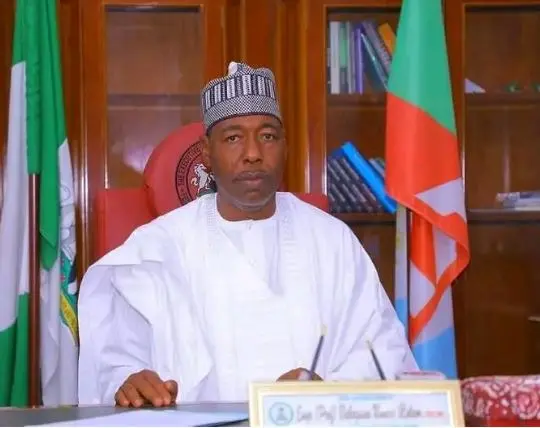Borno introduces new salary structure for doctors to strengthen healthcare system

Borno State Governor, Babagana Zulum, announced a major policy change on Thursday, November 21, declaring that starting December 1, medical doctors in the state’s hospitals will receive the same salaries as their counterparts in federal health institutions.
Governor Zulum made the announcement during the 65th National Council on Health (NCH) Conference in Maiduguri, which focused on the theme: “Accelerating Pathways to Universal Health Coverage: Strategies for 2030 Success.”
The governor explained that the new salary structure was designed to retain qualified medical professionals in the state’s healthcare system and improve service delivery to residents. He expressed concern about the growing brain drain among doctors in Borno, which he attributed to the salary gap between state and federal doctors.
“This issue is of great concern to us,” Zulum said. “I believe this new salary structure and allowances will encourage our doctors to stay and serve within Borno State, ensuring that our healthcare system remains strong and effective.”
The governor also highlighted that the state government had allocated N301 million to support 100 medical doctors currently undergoing residency training in Borno’s health institutions, further investing in the future of the state’s healthcare workforce.
Strengthening healthcare in Borno
Governor Zulum also discussed Borno’s ongoing efforts to strengthen its healthcare system. He emphasized the state’s commitment to the Abuja Declaration, which calls for states to allocate at least 15% of their annual budgets to health. Zulum shared that Borno had already made significant progress in meeting this target, with investments focused on maternal and child healthcare, health infrastructure, and disease control programs.
However, Zulum acknowledged that maternal mortality remains a major challenge in the state, urging immediate action. He expressed strong support for the Maternal Mortality Reduction Initiative, a federal program aimed at removing financial barriers to essential procedures like cesarean sections.
“The initiative is in line with Borno’s goal to improve maternal health, especially in remote areas,” he said, calling for the establishment of a federal medical center in Borno to complement existing healthcare facilities and further enhance services.
Collaboration is key to better healthcare
The governor also underscored the importance of collaboration between federal and state health agencies. He stressed that local leaders must be involved in improving healthcare outcomes and advocated for a community-driven approach to ensure that healthcare interventions are well-targeted and more effective.
“As we continue to strengthen our health systems, we must ensure that every community has access to quality healthcare,” Zulum said. “This will require the collective efforts of all stakeholders—government, local communities, and health organizations.”
The Special Adviser to the President on Health, Salma Anas, praised the governor’s announcement, noting that the new salary structure is a significant step toward addressing the human resource challenges in Borno’s healthcare system. She also emphasized that the policy reflects the state’s dedication to improving healthcare infrastructure and providing essential services to residents, particularly women and children.
The NCH Conference brought together health leaders, policymakers, and other stakeholders to discuss key issues like health workforce development, community engagement, and digital health solutions, with a focus on ensuring better health outcomes for all Nigerians.





